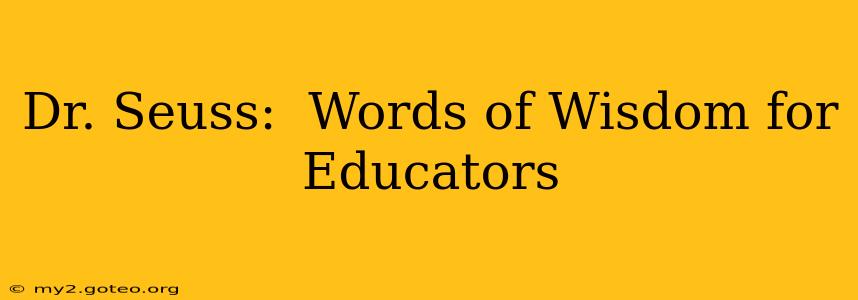Dr. Seuss, the beloved children's author, wasn't just a master of whimsical rhymes and fantastical creatures. His works, while seemingly simple on the surface, contain profound insights into the human condition and the art of teaching. His books offer a wealth of wisdom for educators, providing valuable lessons on creativity, imagination, perseverance, and the importance of embracing differences. This article explores how the philosophies embedded within Dr. Seuss's stories can significantly enhance the educator's toolkit.
What Makes Dr. Seuss's Work Relevant to Educators?
Dr. Seuss's enduring popularity stems from his ability to connect with children on a fundamental level. He champions the power of imagination, tackles complex themes with sensitivity and humor, and fosters a love of reading through engaging narratives. These are all crucial elements in effective education. His books aren't just stories; they are engaging learning experiences disguised as entertainment. They encourage critical thinking, problem-solving, and a lifelong love of learning – core values of any successful educational environment.
How Can Educators Apply Dr. Seuss's Principles in the Classroom?
Celebrating Individuality & Embracing Differences:
Dr. Seuss's characters are wonderfully diverse, each with their own unique quirks and perspectives. Books like The Sneetches and Horton Hears a Who! teach children the importance of celebrating differences and rejecting prejudice. Educators can use these stories to foster a classroom environment that embraces diversity and promotes acceptance among students, regardless of background or ability. This includes incorporating inclusive learning materials and activities that showcase a range of cultures and perspectives.
The Power of Imagination & Creativity:
The whimsical worlds created by Dr. Seuss emphasize the limitless potential of imagination. His fantastical creatures and outlandish settings inspire creativity and encourage children to think outside the box. Educators can foster this by incorporating creative writing exercises, imaginative play, and art projects that encourage students to explore their own unique visions. Providing open-ended activities allows students to embrace their creativity without restriction.
Perseverance & Overcoming Challenges:
Many of Dr. Seuss's stories feature characters who overcome seemingly insurmountable obstacles through perseverance and determination. The Cat in the Hat, for instance, shows how even seemingly chaotic situations can be managed with ingenuity and hard work. Educators can use these stories to teach children the importance of resilience and problem-solving skills. Framing challenges as opportunities for growth can help students develop a positive attitude toward learning and develop their problem-solving abilities.
The Importance of Reading & Literacy:
Dr. Seuss’s rhythmic language and captivating narratives make reading an enjoyable experience. This is crucial for cultivating a love of reading in young children, a fundamental building block for academic success. Educators can use Dr. Seuss books as engaging tools for teaching phonics, vocabulary, and reading comprehension. Reading aloud, incorporating interactive activities, and creating a positive association with reading are invaluable practices to foster a life-long love of books.
Frequently Asked Questions (FAQ)
Q: How can I use Dr. Seuss books to teach specific curriculum topics? Many Dr. Seuss books lend themselves to cross-curricular integration. For example, The Lorax provides an excellent opportunity to discuss environmental issues and conservation, while Yertle the Turtle can spark conversations about power and leadership. Teachers can integrate Dr. Seuss stories with science, social studies, math, and even art classes to make learning more engaging and relevant.
Q: Are there any Dr. Seuss books particularly suited for older students? While many associate Dr. Seuss with early childhood, some of his books, such as The Butter Battle Book, delve into complex themes that are appropriate for older elementary and middle school students, sparking important discussions about conflict resolution and political ideologies.
Q: How can I make Dr. Seuss lessons interactive and engaging? Consider incorporating role-playing, creative writing, art projects, and games based on the books. Encourage student participation through discussions and debates on the themes explored in the stories. Remember to tailor activities to the age and developmental level of your students.
Conclusion:
Dr. Seuss's timeless tales offer a rich source of inspiration and practical wisdom for educators. By embracing his philosophies of creativity, diversity, perseverance, and the love of reading, educators can create a dynamic and engaging learning environment that nurtures the whole child. His legacy continues to inspire a generation of readers and learners, proving that even the most fantastical stories can hold valuable lessons for the real world.

